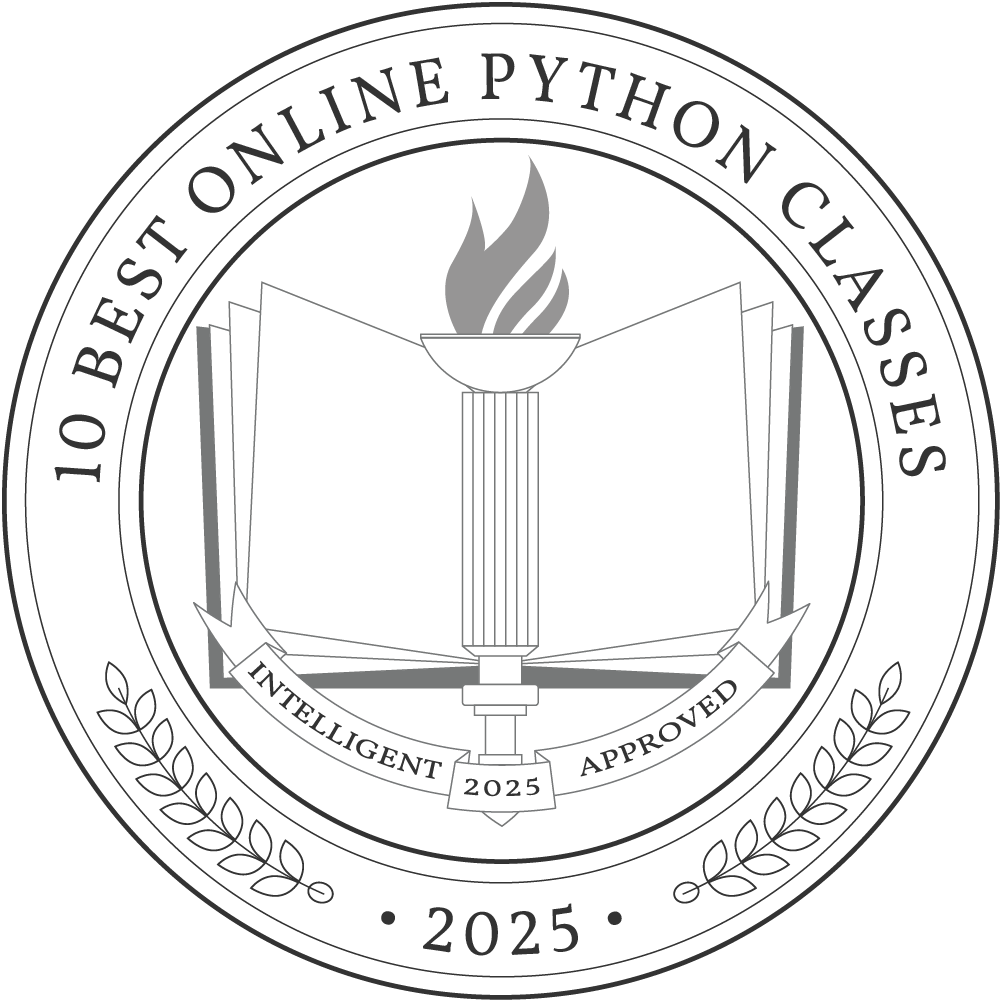Python is one of the most in-demand programming languages since it can be used for web development, data analysis, and more. Like any programming language, learning without any additional guidance can be challenging. That’s why we’ve compiled this list of the 10 best Python courses and tutorials you can learn from no matter your budget and learning style.
- Coursera — Python for Everybody Specialization by the University of Michigan — Top Pick
- Udemy — Introduction to Python Programming — Best for Beginners
- Udemy — Learn Python 3.6 for Total Beginners — Best Instructor
- Udemy — Python From Beginner to Intermediate in 30 min — Shortest Course
- Udemy — Deep Learning Prerequisites: The Numpy Stack in Python (V2+) — Most Advanced
- Udacity — Introduction to Python Programming — Most Interactive
- Codecademy — Analyze Data with Python — Best for Data Nerds
- Codecademy — Learn Python 3 — Best for Your Portfolio
- DataCamp — Introduction to Python — Most Fun
- edX — Introduction to Python Programming by the Georgia Institute of Technology — Most Academic
Our Ranking Criteria
The best online Python courses provide a mix of high-level concepts and real-world skills. We’ve reviewed nearly 20 courses to find the best options based on several key ranking criteria. Whether you’re completely new to programming or want to expand your existing skills, you’ll be able to find a suitable course for you on this list.
Basic ranking criteria
Before diving into a course, you’ll want to research to ensure it’s a good fit for you. Key considerations include how long it takes to complete, whether there are any prerequisites and whether you’ll get a certificate of completion at the end. We’ve focused on these four criteria to narrow down the list.
Time to complete. The courses on our list range from under two hours to around eight months. A short tutorial won’t be able to cover as much material as a complete course, but if you’re just getting started or don’t have time for a longer course, then it may be a good option.
Prerequisites required. Most of the courses on our list don’t have any official prerequisites, but that doesn’t mean they’re all for beginners. Some courses may assume a passing knowledge of computer programming concepts or prior experience with Python.
Flexible schedule. One of the main reasons people choose to take online Python courses is to study at their own pace and schedule. We’ve focused on courses that don’t require you to attend live sessions or meet deadlines, so you can have the most flexibility.
Certificate of completion. If you’re interested in applying for programming jobs, having a certificate of completion may improve your job prospects. Many courses offer free access to lessons and exercises but charge a fee if you want a formal certificate at the end to display on your LinkedIn or professional website.
Advanced ranking criteria
While some criteria, such as a flexible schedule, are important for any online course, we focused on factors especially relevant to online Python courses. Here are a few advanced ranking criteria we used to assemble our course list.
- The course has a comprehensive syllabus that provides a broad overview of Python or focuses on a specific area, such as data analysis.
- The course is presented by university professors or working professionals with extensive Python experience.
- The course includes exercises or interactive lessons students can start working with Python immediately.
- The course has positive ratings (at least four stars).
- The platform is user-friendly and offers reliable customer support.
- The course was produced recently (within the past five years) to ensure the material is consistent with current practices and trends.
- The course is used by companies to train existing employees or is relevant to job-seekers just getting started in the industry.
- The course includes transcripts and/or subtitles for easier study.
The 10 Best Free Online Python Courses and Tutorials
Coursera
Python for Everybody Specialization by the University of Michigan
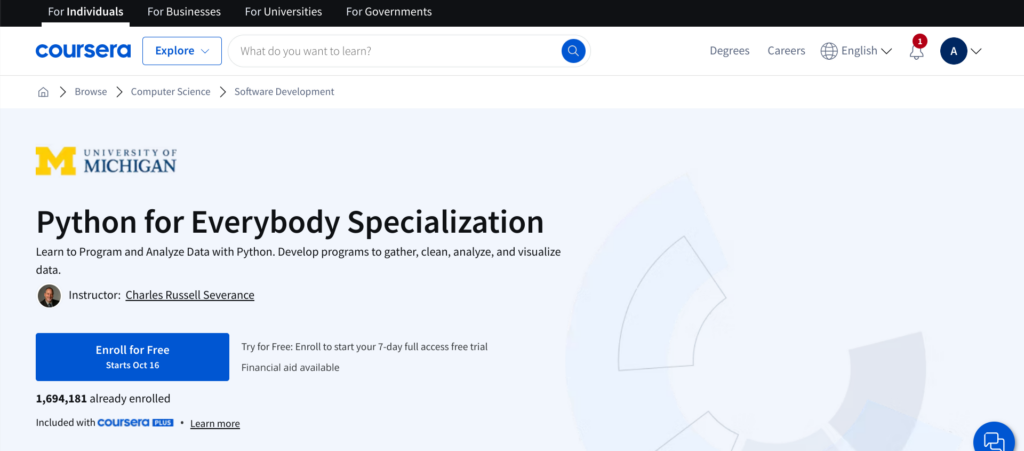
Intelligent Award: Top Pick
This course is offered by the University of Michigan and takes two months to complete. It comprises five components, covering topics like Python data structures, eXtensible Markup Language (XML), and more. This course is included with Coursera Plus or costs $49 per month on its own. You can access the course on any device and move at your own pace, although you’ll need to finish a “hands-on project” to receive the certification. Unlike the other courses on this list, this specialization will take you from introductory material to more advanced topics, all with the same instructor.
- Price: $49 per month
- Time to complete: 2 months (at 10 hours per week)
- Prerequisites required: No
- Flexible schedule: Yes
Who should take this course? This is a good option for those wanting a university-level Python course that can be completed entirely online, including beginners with no programming experience.
| What we like | What we don’t like |
| University-level instructors. | No university credit. |
| Subtitles in multiple languages. | |
| Financial aid is available. |
Udemy
Introduction to Python Programming
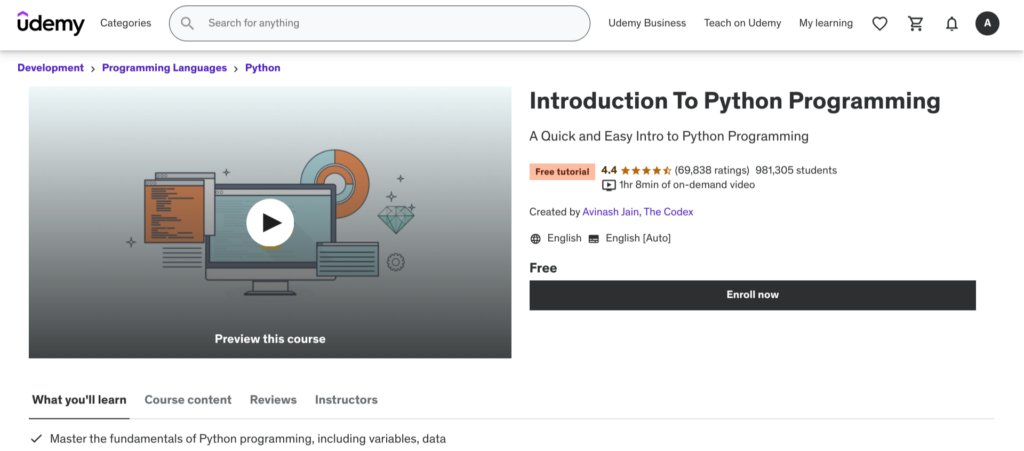
Intelligent Award: Best for Beginners
This “quick and easy intro” is a great tutorial for those who want a basic introduction to Python programming. It’s free and takes less than two hours to complete, but it won’t provide you with a certificate of completion. You’ll learn how to write scripts and functions, even if you don’t have any prior experience with programming. The course includes 22 lectures and is presented by Avinash Jain, a UC Berkeley student who founded TheCodex educational platform.
- Price: Free
- Time to complete: 1 hour and 10 minutes
- Prerequisites required: No
- Flexible schedule: Yes
Who should take this course? It is great for beginners who want to familiarize themselves with the basics of Python without diving too deep into more complex material.
| What we like | What we don’t like |
| Suitable for beginners. | No quizzes or certificate of completion. |
| Easy to follow. |
Udemy
Learn Python 3.6 for Total Beginners
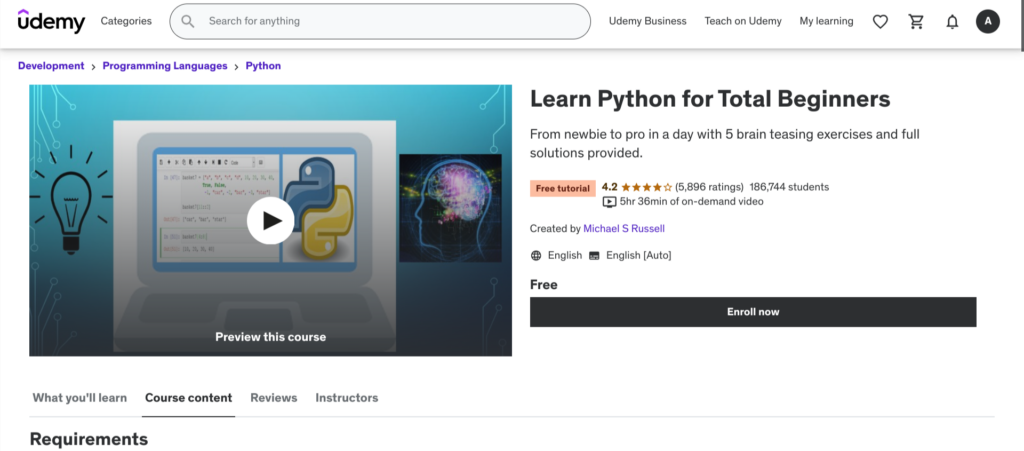
Intelligent Award: Best Instructor
This course focuses on Python 3.6 and features a total of 32 lectures. You’ll learn how to install the Jupyter Notebook, then move on to topics including data structures, loops, functions, and more. There are five exercises along the way to ensure you comprehend the material. It has a 4.2-star rating based on over 5,000 reviews and is taught by an experienced instructor with a master’s degree in financial mathematics. There are no prerequisites other than a computer with internet access and a willingness to learn the material, making this a great option for beginners or novice coders.
- Price: Free
- Time to complete: 5 hours and 35 minutes
- Prerequisites required: No
- Flexible schedule: Yes
Who should take this course? This course is aimed at beginners new to Python but is also suitable for those with experience with another programming language.
| What we like | What we don’t like |
| Experienced instructor. | A few coding and transcription errors. |
| Suitable for beginners. | Some parts move too quickly. |
| Subtitles available. |
Udemy
Python From Beginner to Intermediate in 30 min
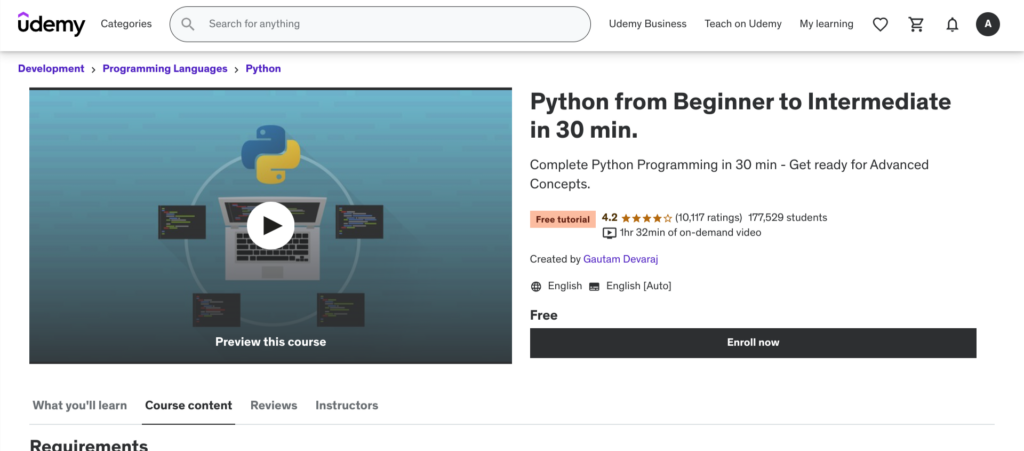
Intelligent Award: Shortest Course
Even after completing a Python course designed for beginners, you may not know enough to keep up with a more advanced course. Udemy’s “Python from Beginner to Intermediate in 30 min” program can help quickly fill the knowledge gaps between basic and advanced Python coding. The video lessons in this course review topics such as modules and functions, sequences and slicing, conditional statements, loop statements, object-oriented programming, and file handling.
- Price: Free
- Time to complete: 1 hour and 32 minutes
- Prerequisites required: No
- Flexible schedule: Yes
Who should take this course? This course is ideal for those who understand the core concepts of the Python programming language but don’t know much about it beyond that.
| What we like | What we don’t like |
| Helps Python learners prepare for advanced courses. | No instructor to engage with. |
Udemy
Deep Learning Prerequisites: The Numpy Stack in Python (V2+)
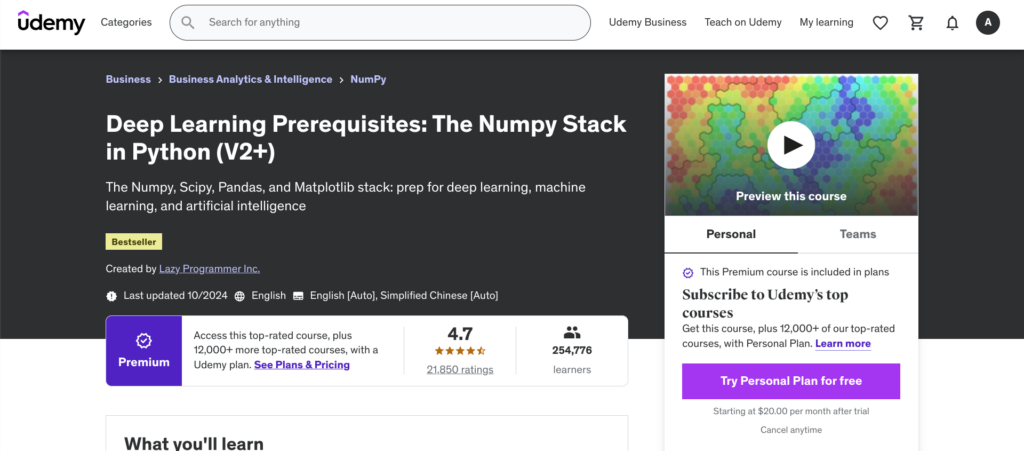
Intelligent Award: Most Advanced
This course isn’t for total Python beginners as it assumes some coding experience and is intended to prepare you to study deep learning and data science. It specifically focuses on the Numpy Stack, which you’ll need to be familiar with before taking more advanced courses. Other topics covered include Pandas, SciPy, and Matplotlib. The prerequisites for this course include matrix arithmetic and basic Python coding, and if you aren’t sure you’re ready for it, you can view the “Machine Learning and AI Prerequisite Roadmap” to find out which order to take the courses in.
- Price: $99.99
- Time to complete: 5 hours and 54 minutes
- Prerequisites required: Yes
- Flexible schedule: Yes
Who should take this course? This course is recommended for professionals who already have some Python experience but want to learn more about the Numpy Stack so they can move on to more advanced machine learning and data science courses.
| What we like | What we don’t like |
| Helpful FAQ section. | Too advanced for some users. |
| Bonus exercises. |
Udacity
Introduction to Python Programming

Intelligent Award: Most Interactive
This course will teach you how to “solve practical problems” using Python, covering topics such as data storage, conditionals, and loops. The course is designed for beginners and takes around three weeks to complete. You can work through it independently, with interactive quizzes to keep you engaged. It prepares you for follow-up courses like the Data Analyst Nanodegree program. Although there are no formal prerequisites, some programming knowledge is recommended. You can work on Python scripts immediately, making this the most interactive course on our list and ideal for hands-on problem-solvers.
- Price: Free
- Time to complete: Approximately 3 weeks
- Prerequisites required: No
- Flexible schedule: Yes
Who should take this course? This course is intended for students who are learning Python for the first time but have some other programming experience.
| What we like | What we don’t like |
| Professional instructors. | Some programming experience is recommended. |
| Engaging lessons and exercises. |
Codecademy
Analyze Data with Python
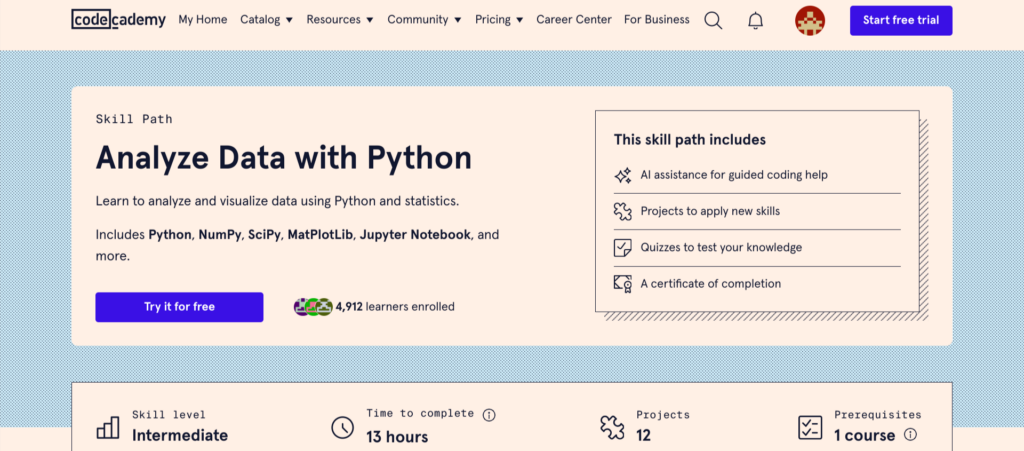
Intelligent Award: Best for Data Nerds
Codecademy is known for “gamifying” the process of learning to code, just like Duolingo does for learning languages. This means you’ll move through interactive exercises and projects instead of just watching video lectures. This course focuses on data analysis and will help you apply Python programming to visualize and interpret data sets. You’ll also learn how to run A/B tests on real-world business examples, including a food startup and a shoe store. Other topics include Python libraries like NumPy and SciPy and data visualization with Matplotlib. You can try out Codecademy for free, but you’ll need a Plus account to access some materials and receive a certification of completion. This course is best for data nerds who want to learn how to apply Python scripts to solve mathematical problems.
- Price: Basic: Free (No Certificate), Plus: $14.99 per month
- Time to complete: 13 hours
- Prerequisites required: No
- Flexible schedule: Yes
Who should take this course? It is designed for people who want to “move beyond Excel” and write more complex Python codes for data analysis and statistical testing.
| What we like | What we don’t like |
| Interactive exercises. | Some content requires a subscription. |
| Real-world examples. | Lacks a traditional class structure. |
| User-friendly platform. |
Codecademy
Learn Python 3
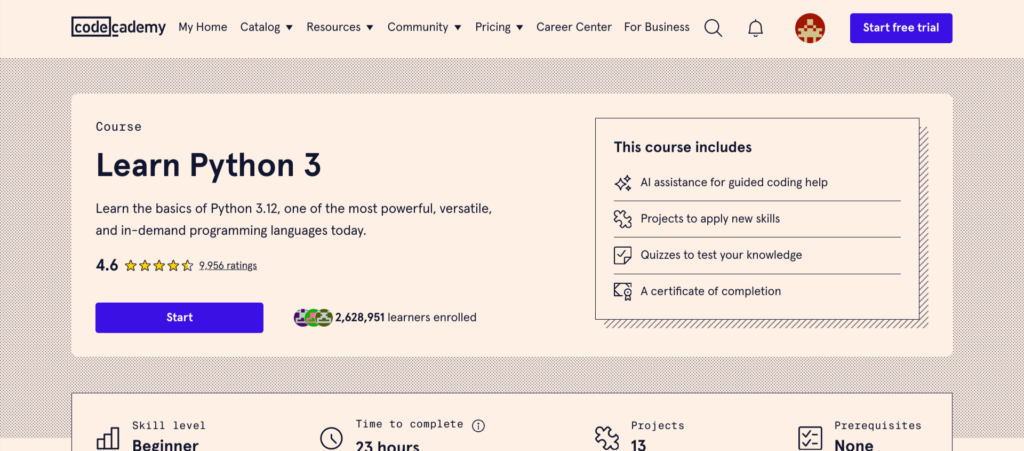
Intelligent Award: Best for Your Portfolio
This Codecademy course covers all of the basics of Python 3, including Python syntax, control flow, boolean variables, and logical operators. Along the way you can take optional code challenges to see how well you’re learning the material. If you sign up for a Plus account, you’ll also have access to several portfolio projects, such as ASCII art and a Magic 8-Ball project you can use to show off your skills to your friends or prospective employers. This course takes around 30 hours to complete and has been taken by employees at companies like IBM and NASA. Plus subscribers will get a certificate of completion to add to their resume or LinkedIn profile, making this the best choice for self-promotion and portfolio-building.
- Price: Basic: Free (No Certificate), Plus: $14.99 per month
- Time to complete: 23 hours
- Prerequisites required: No
- Flexible schedule: Yes
Who should take this course? This course is best for beginners who learn best by doing and want to develop practical skills that they can add to their resume.
| What we like | What we don’t like |
| Includes code challenges and portfolio projects. | No certificate for free users. |
| User-friendly platform. | No instructor to engage with. |
DataCamp
Introduction to Python
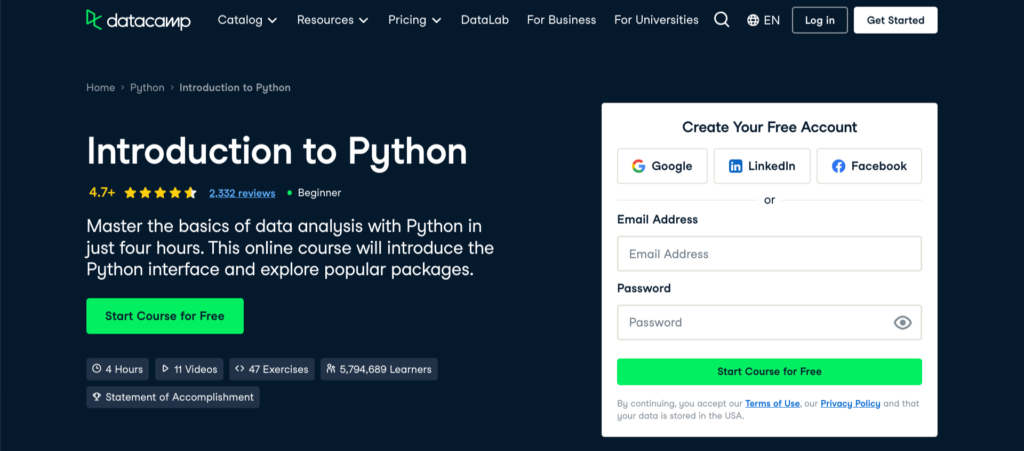
Intelligent Award: Most Fun
This course focuses on data analysis and includes four sections comprising 11 videos and 47 exercises. The first section, Python Basics, is free, while the following sections require a DataCamp subscription. You’ll work with datasets from MLB baseball and FIFA soccer to help you engage with the material in a fun and relatable way. You’ll also learn to use the NumPy Python library for advanced data analysis. The course takes around four hours to complete and is taught by a professional data scientist who performs stand-up comedy and hosts the DataCamp podcast. This makes it the most fun online Python course on our list, providing a solid introduction to the material.
- Price: Basic: Free, Premium: $14 per month
- Time to complete: 4 hours
- Prerequisites required: No
- Flexible schedule: Yes
Who should take this course? This course is for users who want to learn Python in a fun and engaging way that isn’t as formal and structured as a traditional classroom lecture.
| What we like | What we don’t like |
| User-friendly interface. | Only the first section is free. |
| Gamified learning structure. | Not challenging enough. |
edX
Introduction to Python Programming by the Georgia Institute of Technology
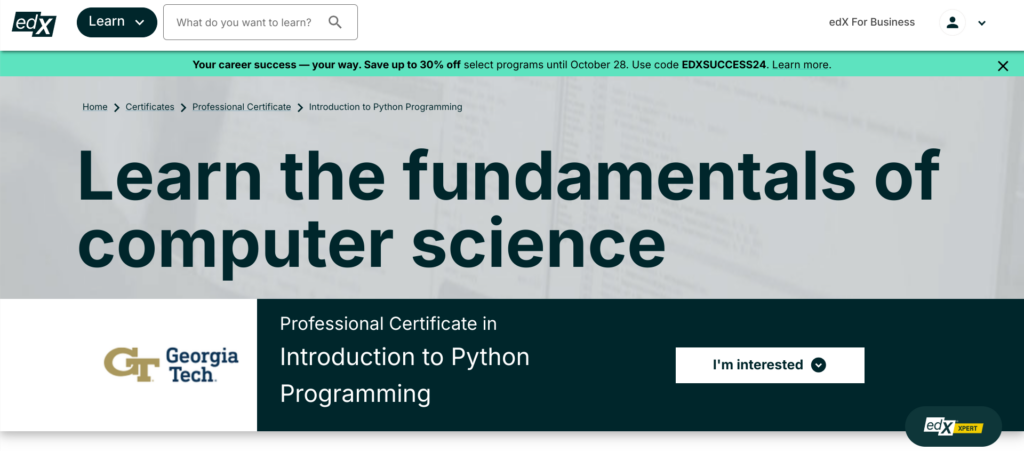
Intelligent Award: Most Academic
This course is offered by the Georgia Institute of Technology, making it one of the most academic options on our list. The full program includes four courses that cover Python fundamentals, control and data structures, algorithms, and more. You’ll be taught by professional instructors through video lessons and exercises. No official prerequisites exist, but basic math and high school algebra are recommended. The course takes five months to complete, and you’ll need to pick a session start date to enroll.
- Price: $756
- Time to complete: 5 months (at 9-10 hours per week)
- Prerequisites required: No
- Flexible schedule: Yes
Who should take this course? This course is suitable for beginners and is best for those who want to follow a university-level syllabus and learn from professional instructors.
| What we like | What we don’t like |
| Backed by Georgia Tech. | Limited enrollment dates. |
| Comprehensive syllabus. |
Online Course Comparison Chart
| Course | Price | Features |
| Coursera — Python for Everybody Specialization by the University of Michigan— Top Pick | $49 per month | ✓ No prerequisites required
✓ Flexible schedule ✓Verified certificate |
| Udemy — Introduction to Python Programming — Best for Beginners | Free | ✓ No prerequisites required
✓ Flexible schedule X Verified certificate |
| Udemy — Learn Python 3.6 for Total Beginners — Best Instructor | Free | ✓ No prerequisites required
✓ Flexible schedule X Verified certificate |
| Udemy — Python From Beginner to Intermediate in 30 min — Shortest Course | Free | ✓ No prerequisites required
✓ Flexible schedule X Verified certificate |
| Udemy — Deep Learning Prerequisites: The Numpy Stack in Python (V2+) — Most Advanced | $99.99 | X No prerequisites required
✓ Flexible schedule X Verified certificate |
| Udacity — Introduction to Python Programming — Most Interactive | Free | ✓ No prerequisites required
✓ Flexible schedule X Verified certificate |
| Codecademy — Analyze Data with Python — Best for Data Nerds | Basic: Free (No Certificate), Plus: $14.99 per month | ✓ No prerequisites required
✓ Flexible schedule ✓ Verified certificate |
| Codecademy — Learn Python 3 — Best For Your Portfolio | Basic: Free (No Certificate), Plus: $14.99 per month | ✓ No prerequisites required
✓ Flexible schedule ✓ Verified certificate |
| DataCamp — Introduction to Python — Most Fun | Basic: Free, Premium: $14 per month | ✓ No prerequisites required
✓ Flexible schedule X Verified certificate |
| edX — Introduction to Python Programming by the Georgia Institute of Technology — Most Academic | $756 | ✓ No prerequisites required
✓ Flexible schedule ✓ Verified certificate |
Tips for succeeding in an Online Python Course
1. Consider the cost
How much do online Python classes cost?
Most of the Python courses on our list are free to access but may charge a flat fee or a monthly membership if you want a formal certificate of completion. The most expensive certificate is $756, while the cheapest membership is $14 per month. On the other hand, an in-person Python class could cost thousands of dollars, so studying online is likely to be a more affordable option. You’ll need to decide whether a certificate is important to you, or whether you just want access to the online course material.
Will my employer pay for me to take the course?
It’s common for employers to cover the cost of professional development courses and more and more companies are looking for employees with Python experience. Several of the courses on this are included with Udemy for Business, which is used by major brands to provide ongoing employee training. Be sure to ask your boss or HR department in advance if they can cover the cost of your course or certificate.
2. Get your tech squared away
Before starting the course, make sure you have all the equipment you’ll need to participate. Most courses are delivered via streaming video, so you’ll need a computer with a reliable Internet connection that can stream online video. You may also need an Integrated Developed Environment (IDE) if you plan to write and run scripts yourself.
3. Use the right study resources
Your course may recommend a textbook or provide a reading list. If not, or if you want to supplement with additional resources, try Head First Python: A Brain-Friendly Guide or Automate the Boring Stuff with Python: Practical Programming for Total Beginners. Both of these books provide a practical, easy-to-follow introduction to Python.
Frequently Asked Questions About Python Courses
What jobs can you get after completing a Python course?
After completing a Python course, the most straightforward career path is to become a Python developer or product manager. This may include working on web development products or data analytics. Python skills can be useful in other industries, such as finance, where coding skills are increasingly in demand. The average Python salary is over $100,000, although completing a course won’t guarantee a job, and other skills or credentials may be required.
Are there free online Python courses?
There are dozens of online Python courses available for free. For example, most of the courses featured in this guide are free to attend, though some of these options will require you to pay a fee to get a certificate of completion.
How long is the average online Python course?
Some beginner tutorials can be completed in just a few hours, while in-depth courses take anywhere from five weeks to eight months.
How quickly can I learn Python?
If you want to learn the basics, you can learn Python in a few weeks. Python is known for being readable and less complex than other programming languages. Learning more advanced skills will take longer.
How much does a Python certification cost?
Depending on where you get it, you can expect to pay several hundred dollars for a certificate. If your course doesn’t include a certificate, or if you already know Python, you can take a certification exam through the Python Institute for $59 to $295.
Is Python free to download?
Python is open-source and entirely free. You can download it at Python.org and run it on all major operating systems.
Interested in a degree instead?
Learn more about online degrees, their start dates, transferring credits, availability of financial aid, and more by contacting the universities below.
